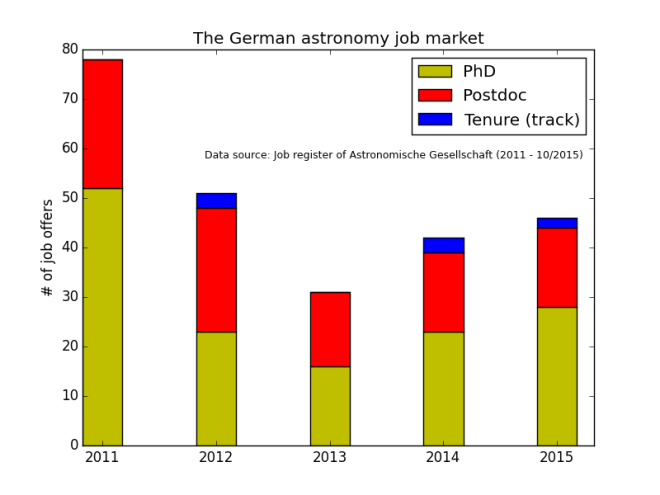There is a lot of discussion about the dismal prospects for an academic career, especially in the German astronomy community, but there are hardly any numbers. Here I would like to provide some.
Since several years, the German Astronomical Society (Astronomische Gesellschaft) collects job offers for German (and some international) openings on their job register. While this is certainly not complete, it is pretty extensive and my impression is that most major jobs that are publicly advertised can also be found there. So I went through the list of about 300 offerings from 2011 to date and categorized all jobs into three categories “PhD position”, “Postdoc position” (i.e. academic non-tenured position) and “tenured or tenure-track position” (i.e. professorships, research assistants, but also PR jobs with close academic relations). I selected only jobs in Germany which shrinks the list to 248 positions (note that some offerings were for multiple positions). Without further ado, here’s the result:

A couple of notes:
- Assuming that most Ph.D. offerings lead to the production of 1 astronomer, the “production rate” of astronomers in Germany is about 30/year. (Note added 21 Oct 2015: Actually, the number is even higher since only a fraction of Ph.D. positions are advertised via this jobregister. In Heidelberg and Munich alone, two big astro places in Germany, there are probably about 30 Ph.D. offerings per year)
- The number of postdoc offerings is similar to the number of Ph.D. offerings suggesting that either almost all Ph.D.s stay in academia or that those who stay remain in the postdoc phase for a long time.
- The ratio of production rate (30/yr) to the “sink rate” (tenured or tenure-track position, 1.6/yr), let’s call this the oversubscription factor, is about 20.
- About half of the tenured positions are PR positions such as planetarium jobs or editors for astronomical magazines; the W1 junior professorship that were offered were not tenured or tenure-track. They are essentially junior groupleader positions with additional teaching.
A couple of thoughts:
- An oversubscription of about 10 (roughly the case for proposals to ALMA from Europe or the U.S.) is considered unproductive by many senior astronomers.
- It seems hard to avoid the conclusion that either the job register or the job market is flawed.